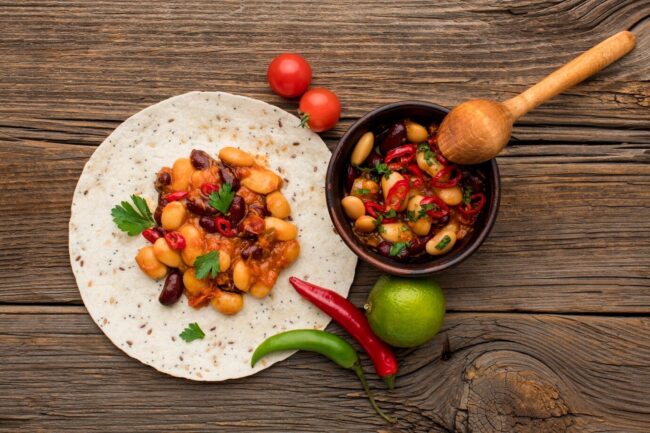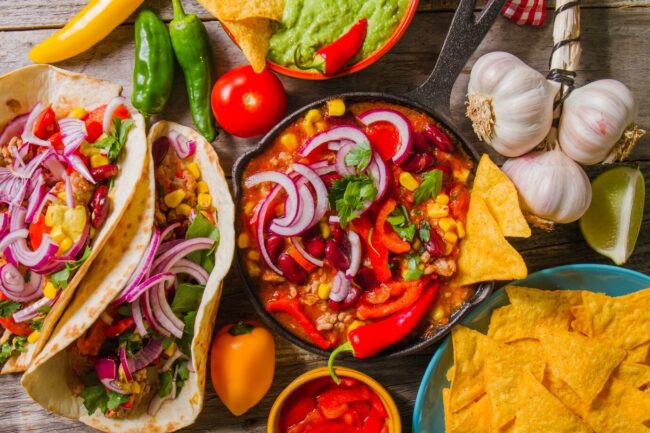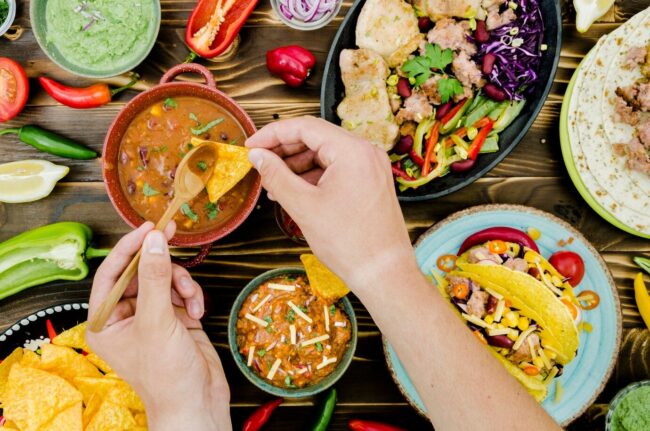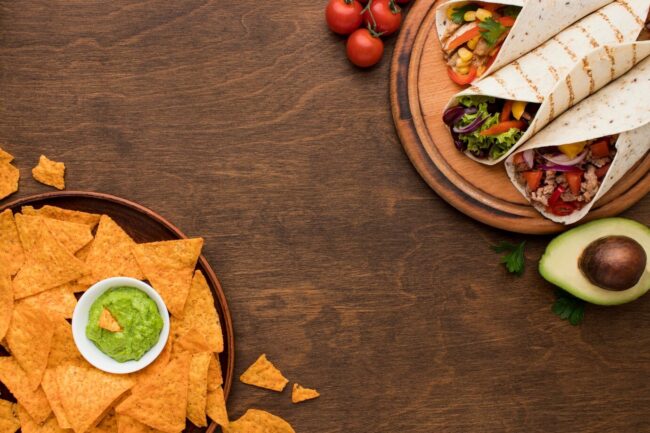When most people think about Mexican food, they might imagine delicious tacos, mouth-watering enchiladas, and crunchy nachos loaded with cheese. However, there’s a common question that pops up in the minds of many: Is Mexican food a healthy choice? Let’s dive into this flavorful world and uncover the truth behind Mexican cuisine, especially for those seeking a healthy yet tasty dining option.
Understanding Mexican Food
Mexican food is a vibrant blend of indigenous Mesoamerican cooking with European, particularly Spanish, influences that came in after the Spanish colonization of the Americas. The staples of Mexican cuisine are corn, beans, tomatoes, avocados and chili peppers, along with rice, which the Spanish brought. These ingredients make up the heart and soul of Mexican dishes, providing a diverse palette of flavors and nutritional benefits.
One of the best parts about Mexican food is its variety. From tacos and burritos to guacamole and salsa, there’s a whole world of dishes to explore. But what makes these dishes truly special is the fresh, colorful, and nutrient-packed ingredients that are often used to create them.
The Health Benefits of Mexican Food

Mexican food is renowned worldwide for its colorful blend of flavors that pleases your taste buds, but the fact is that it’s not just about the taste only. You can find the best catering restaurants in Houston or your city offering Mexican food packed with an assortment of nutrients that can contribute to a balanced diet.
Ingredients like beans, tomatoes, avocados, and corn are staples in Mexican cuisine. These ingredients aren’t just tasty; they’re also filled with vitamins, fibers and minerals that are essential for maintaining good health.
Beans
Often served as a side or integrated into main dishes, beans are a fantastic source of protein and fiber. They can keep you feeling full longer, which helps control appetite and weight.
Tomatoes
Loaded with vitamins C and K, potassium, and folate, tomatoes are a nutrient-dense food that supports heart health and provides antioxidants.
Avocados
These creamy fruits are rich in heart-healthy monounsaturated fats that help lower bad cholesterol levels. They’re also packed with fiber and potassium.
Corn
A staple grain in Mexican cuisine, corn is high in fiber and provides essential minerals like zinc, magnesium, copper, iron, and manganese.
How to Make Healthy Choices?
Choosing healthier options doesn’t mean sacrificing flavor. Here are a few ways to make healthier choices when enjoying Mexican food:
- Go for Grilled: Choose dishes with grilled meats and vegetables instead of fried.
- Skip the Heavy Sauces: Opt for lighter salsas or pico de gallo instead of cream-based sauces or melted cheese.
- Choose Your Sides Wisely: Instead of refried beans and rice, ask for a side salad or grilled vegetables.
Common Misconceptions About Mexican Food

Mexican food often gets a bad rap in the health community, but much of this reputation is based on misunderstandings and generalizations. Let’s unpack some of these myths and reveal the truth about the diversity and nutritional value of Mexican cuisine.
Myth #1: Mexican Food Is Too Fatty and Unhealthy
One of the most pervasive misconceptions about Mexican food is that it’s inherently unhealthy, overly greasy, and loaded with fat. This view, however, neglects the rich variety of Mexican dishes that prioritize fresh ingredients, lean proteins, and complex flavors over excessive use of fats.
Yes, dishes like quesadillas, nachos, and some types of burritos can be heavy on cheese and sour cream. However, these are just a few examples of a much broader culinary tradition. Many traditional Mexican meals are based on ingredients that promote good health.
For instance, a typical Mexican meal might include grilled fish seasoned with lime and cilantro, served alongside a salad of fresh greens, or a soup filled with vegetables and beans. These options emphasize balance and nutrition, incorporating lean proteins like chicken, fish, and turkey, as well as plenty of vegetables.
Myth #2: It’s All About the Meat
Another common misconception is that Mexican cuisine is not friendly to vegetarians or those looking to reduce their meat consumption. This couldn’t be further from the truth. Mexican food offers a cornucopia of vegetarian options that are packed with flavor and nutritious.
Legumes play a starring role in Mexican vegetarian cuisine, with dishes featuring beans and lentils as primary sources of protein. These ingredients are not only filling and heart-healthy but also versatile, serving as the foundation for a variety of cuisines, from tacos and burritos to salads and soups. Vegetables, too, are celebrated in Mexican cooking, with dishes like chiles rellenos (stuffed peppers), vegetable quesadillas, and enchiladas filled with fresh produce like zucchini, corn, and tomatoes.
Myth #3: Everything Is Spicy

The assumption that all Mexican food is spicy is a misconception that overlooks the complexity and nuance of Mexican cuisine. While it’s true that chili peppers are a common ingredient, their use is varied and does not necessarily mean every dish is fiery hot.
Mexican cuisine offers a huge range of dishes that cater to all palates, including many that are mild and accessible to those who are sensitive to spice. The use of chili peppers in Mexican cooking is more about adding depth and flavor than merely providing heat. Ingredients like bell peppers, tomatoes, onions, and herbs contribute to the rich flavor profiles of Mexican dishes without adding spiciness.
Final Thoughts
Mexican food, with its rich flavors and variety, can absolutely be a healthy choice when enjoyed as part of a balanced diet. It’s all about making mindful choices and enjoying the fresh, colorful, and nutritious ingredients that Mexican cuisine has to offer.
Look for the best restaurants in your area to enjoy some delicious and healthy Mexican cuisine. Remember, there are many options that can cater to your dietary preferences and needs, ensuring you get a taste of this wonderful cuisine in the healthiest way possible.
So, don’t shy away from adding a little spice and flavor to your meals. Mexican food is not just tasty; it can also be a nourishing addition to your diet!





